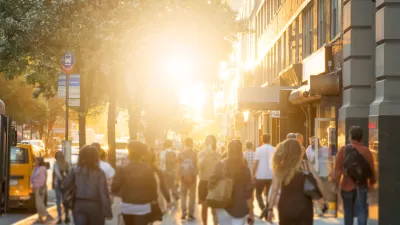The age of sprawl is ending in Atlanta, according to Christopher Leinberger, who highlights the city's move towards a more dense, walkable future.
"The underlying population and employment growth will continue -- well above national rates. However, where that growth will locate is evolving."
"We are witnessing the beginning of the end of sprawl. Like much of the rest of the country, the overproduction of automobile-driven suburban development at the fringe of the Atlanta metropolitan area has reached its limits. The combination of outrageous commutes, environmental degradation and the increasing number of consumers preferring a "walkable urban" way of life have combined to start the end of the geometric increase in land consumption of the past half century."
"Metro Atlanta is following a national trend in creating and growing high-density, walkable urban places. The two-week party that was the Olympics in 1996 first showed you how exciting a temporary walkable urban place could be, and you set out to make it permanent over the subsequent decade."
"But it definitely is not confined to downtown."
FULL STORY: Sprawl to meet its limit in Atlanta

Planetizen Federal Action Tracker
A weekly monitor of how Trump’s orders and actions are impacting planners and planning in America.

Congressman Proposes Bill to Rename DC Metro “Trump Train”
The Make Autorail Great Again Act would withhold federal funding to the system until the Washington Metropolitan Area Transit Authority (WMATA), rebrands as the Washington Metropolitan Authority for Greater Access (WMAGA).

The Simple Legislative Tool Transforming Vacant Downtowns
In California, Michigan and Georgia, an easy win is bringing dollars — and delight — back to city centers.

The States Losing Rural Delivery Rooms at an Alarming Pace
In some states, as few as 9% of rural hospitals still deliver babies. As a result, rising pre-term births, no adequate pre-term care and "harrowing" close calls are a growing reality.

The Small South Asian Republic Going all in on EVs
Thanks to one simple policy change less than five years ago, 65% of new cars in this Himalayan country are now electric.

DC Backpedals on Bike Lane Protection, Swaps Barriers for Paint
Citing aesthetic concerns, the city is removing the concrete barriers and flexposts that once separated Arizona Avenue cyclists from motor vehicles.
Urban Design for Planners 1: Software Tools
This six-course series explores essential urban design concepts using open source software and equips planners with the tools they need to participate fully in the urban design process.
Planning for Universal Design
Learn the tools for implementing Universal Design in planning regulations.
Smith Gee Studio
City of Charlotte
City of Camden Redevelopment Agency
City of Astoria
Transportation Research & Education Center (TREC) at Portland State University
US High Speed Rail Association
City of Camden Redevelopment Agency
Municipality of Princeton (NJ)



























